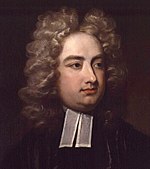Portal:Speculative fiction/Selected biography/25
Jonathan Swift (30 November 1667 – 19 October 1745) was an Anglo-Irish satirist, essayist, political pamphleteer (first for the Whigs, then for the Tories), poet and cleric who became Dean of St. Patrick's Cathedral, Dublin.
He is remembered for works such as Gulliver's Travels, A Modest Proposal, A Journal to Stella, Drapier's Letters, The Battle of the Books, An Argument Against Abolishing Christianity, and A Tale of a Tub. Swift is probably the foremost prose satirist in the English language, and is less well known for his poetry. Swift originally published all of his works under pseudonyms—such as Lemuel Gulliver, Isaac Bickerstaff, M.B. Drapier—or anonymously. He is also known for being a master of two styles of satire: the Horatian and Juvenalian styles.
Gulliver's Travels, of which Swift wrote a large portion in Woodbrook House, County Laois was first published in 1726, and is regarded as his masterpiece. As with his other writings, the Travels was published under a pseudonym, the fictional Lemuel Gulliver, a ship's surgeon and later a sea captain. Some of the correspondence between printer Benj. Motte and Gulliver's also-fictional cousin negotiating the book's publication has survived. Though it has often been mistakenly thought of and published in bowdlerized form as a children's book, it is a great and sophisticated satire of human nature based on Swift's experience of his times. Gulliver's Travels is an anatomy of human nature, a sardonic looking-glass, often criticized for its apparent misanthropy. It asks its readers to refute it, to deny that it has not adequately characterized human nature and society. Each of the four books--recounting four voyages to mostly-fictional exotic lands--has a different theme, but all are attempts to deflate human pride. Critics hail the work as a satiric reflection on the failings of Enlightenment modernism.

